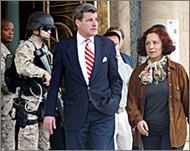Occupation soldier killed near Baghdad
A US soldier was killed in a rocket-propelled grenade attack south of Baghdad on Sunday even as the occupation forces launched an offensive involving aerial bombing and mass arrests.

“One soldier was killed yesterday (Sunday) at 7pm (1600 GMT),” a military spokeswoman said on Monday.
“He is from the 18th Military Police brigade. He was killed in a rocket-propelled grenade attack west of Iskandariya,” about 40km (25 miles) south of the capital, she said.
The US military arrested more than 140 people in 24 hours, but the slain soldier and two powerful explosions in the Iraqi capital signalled continuing instability.
US forces stormed areas around Baghdad and north and west of the capital during Sunday in an attempt to crush the resistance that had grown more bold in the last month, shooting down two helicopters and destroying at least one tank.
The two explosions were heard in Baghdad late on Sunday. It was not clear where the blasts occurred, but attackers had been shelling the US-led coalition’s Baghdad compound on an almost nightly basis since the end of October.
Rocket suspects detained
During its drive to root out resistance fighters, the US military detained 35 people in connection with the 26 October rocket attack on Baghdad’s Rashid hotel which killed a US colonel and wounded 17 others, a senior US officer told AFP.
“We detained a total of 35,” he said, identifying them all as “former regime loyalists.”
The men were rounded up in an early Saturday raid on Baghdad’s ritzy Mansur district by four companies from the US army’s First Armoured Division.
He described them as a collection of financiers, weapon makers and commanders of guerrilla-style cells that were planning major attacks on occupation forces.
In northern Iraq, US forces detained a tribal chief for allegedly hosting a former prominent member of the Saddam Hussein regime, police and relatives reported.
|
“Both the number and the intensity of our targeted raids continue to increase as we take the fight to the enemy within the Baathist heartland” US military spokesman |
The capture of the suspects revealed the US military’s heavy reliance on Iraqi intelligence as it tried to get on sure footing, following a wave of attacks in the capital last month.
In advance of Saturday’s pre-dawn raid, the army sent out Iraqi informants to track and locate where some of the suspects lived.
Aerial bombardment
The high-profile raid came as part of an intensified hunt for Saddam loyalists around the country, which resulted in a total of 140 arrests and also involved dropping bombs in areas considered centres of resistance.
“Both the number and the intensity of our targeted raids continue to increase as we take the fight to the enemy within the Baathist heartland,” a military spokesman said, referring to strongholds of Saddam Hussein and his former ruling Baath party north and west of Baghdad.
US warplanes dropped three 230kg (500lb) bombs just outside Fallujah in areas considered hideouts of combatants.
The bombings followed a similar show of force by the Fourth Infantry Division near Saddam’s hometown of Tikrit, after a Black Hawk helicopter crashed to the ground on Friday.
The crash killed six soldiers and led some officers to speculate the helicopter had been shot down by a rocket-propelled grenade, though military spokesmen insisted they did not yet know what caused the downing.
Three US soldiers were wounded after being ambushed on patrol near the volatile city of Fallujah late on Saturday, the military said.
Bremer hurries council
 |
|
Paul Bremer with supportive Spanish FM Ana Palacio |
Faced with the growing unrest, Bremer said on Sunday it was nearly time for Iraq’s 24-member interim Governing Council to move ahead with the drafting of a constitution and present a calendar for national elections.
Bremer spoke amid grumbling from Washington about the slow pace of the US-picked council in deciding on how to draft a constitution, after a study committee presented its findings on the best way to move forward a month ago.
“They are required by the terms of Resolution 1511 in the Security Council to provide a timeline and a process for how they’re going to write a constitution, and they have to do that within the next month,” Bremer said.
The UN Security Council resolution passed last month, which gave new legitimacy to the US occupation of Iraq, called on the Governing Council to present a time frame for the drafting of the constitution and holding of national elections by 15 December.